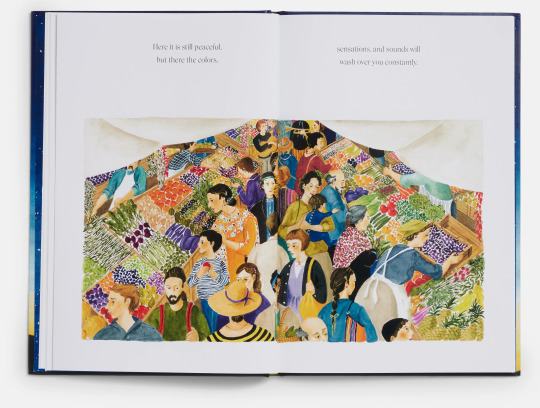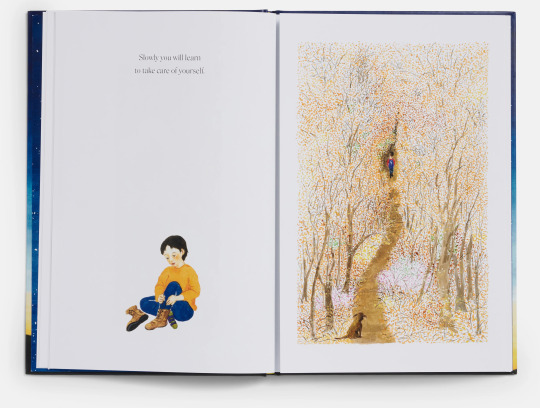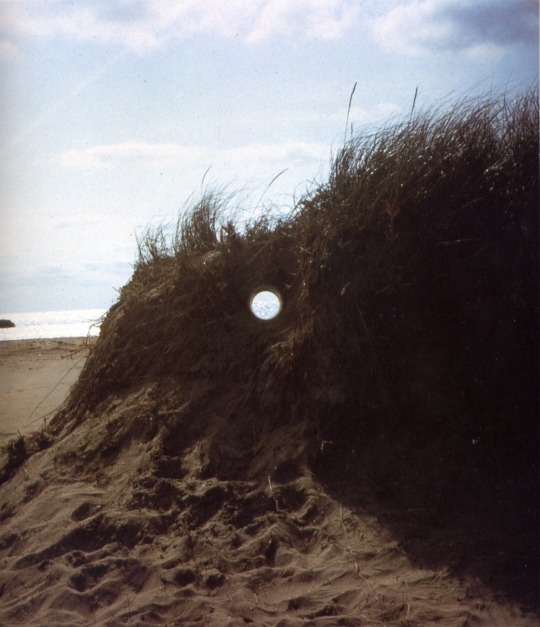Photo



Once upon a time in the west, Wim Wenders
6K notes
·
View notes
Text



Star Child by Claire Nivola
1 note
·
View note
Text
Little Sleep's-Head Sprouting Hair in the Moonlight by Galway Kinnell 1
You scream, waking from a nightmare.
When I sleepwalk into your room, and pick you up, and hold you up in the moonlight, you cling to me hard, as if clinging could save us. I think you think I will never die, I think I exude to you the permanence of smoke or stars, even as my broken arms heal themselves around you.
2
I have heard you tell the sun, don't go down, I have stood by as you told the flower, don't grow old, don't die. Little Maud,
I would blow the flame out of your silver cup, I would suck the rot from your fingernail, I would brush your sprouting hair of the dying light, I would scrape the rust off your ivory bones, I would help death escape through the little ribs of your body, I would alchemize the ashes of your cradle back into wood, I would let nothing of you go, ever,
until washerwomen feel the clothes fall asleep in their hands, and hens scratch their spell across hatchet blades, and rats walk away from the culture of the plague, and iron twists weapons toward truth north, and grease refuse to slide in the machinery of progress, and men feel as free on earth as fleas on the bodies of men, and the widow still whispers to the presence no longer beside her in the dark.
And yet perhaps this is the reason you cry, this the nightmare you wake screaming from: being forever in the pre-trembling of a house that falls.
3
In a restaurant once, everyone quietly eating, you clambered up on my lap: to all the mouthfuls rising toward all the mouths, at the top of your voice you cried your one word, caca! caca! caca! and each spoonful stopped, a moment, in midair, in its withering steam.
Yes, you cling because I, like you, only sooner than you, will go down the path of vanished alphabets, the roadlessness to the other side of the darkness, your arms like the shoes left behind, like the adjectives in the halting speech of old folk, which once could call up the lost nouns.
4
And you yourself, some impossible Tuesday in the year Two Thousand and Nine, will walk out among the black stones of the field, in the rain,
and the stones saying over their one word, ci-gît, ci-gît, ci-gît,
and the raindrops hitting you on the fontanel over and over, and you standing there unable to let them in.
5
If one day it happens you find yourself with someone you love in a café at one end of the Pont Mirabeau, at the zinc bar where wine takes the shapes of upward opening glasses,
and if you commit then, as we did, the error of thinking, one day all this will only be memory,
learn to reach deeper into the sorrows to come—to touch the almost imaginary bones under the face, to hear under the laughter the wind crying across the black stones. Kiss the mouth that tells you, here, here is the world. This mouth. This laughter. These temple bones.
The still undanced cadence of vanishing.
6
In the light the moon sends back, I can see in your eyes the hand that waved once in my father's eyes, a tiny kite wobbling far up in the twilight of his last look:
and the angel of all mortal things lets go the string.
7
Back you go, into your crib.
The last blackbird lights up his gold wings: farewell. Your eyes close inside your head, in sleep. Already in your dreams the hours begin to sing.
Little sleep's-head sprouting hair in the moonlight, when I come back we will go out together, we will walk out together among the ten thousand things, each scratched in time with such knowledge, the wages of dying is love.
1 note
·
View note
Photo
"The thousands stand and chant. Around them in the world, people ride escalators going up and sneak secret glances at the faces coming down. People dangle teabags over hot water in white cups. Cars run silently on the autobahns, streaks of painted light. People sit at desks and stare at office walls. They smell their shirts and drop them in the hamper. People bind themselves into numbered seats and fly across time zones and high cirrus and deep night, knowing there is something they’ve forgotten to do.
The future belongs to crowds." - Don Delillo, Mao II

992 notes
·
View notes
Text

Wisława Szymborska, A Contribution to Statistics [from New Poems, 1993-1997], in Poems, New and Collected, 1957-1997, Translated from the Polish by Stanisław Barańczak and Clare Cavanagh, Harcourt, Brace and Company, New York, NY, 1998, pp. 263-264

78 notes
·
View notes
Text
This is the great lesson the depressive learns: Nothing in the world is inherently compelling. Whatever may be really “out there” cannot project itself as an affective experience. It is all a vacuous affair with only a chemical prestige. Nothing is either good or bad, desirable or undesirable, or anything else except that it is made so by laboratories inside us producing the emotions on which we live. And to live on our emotions is to live arbitrarily, inaccurately—imparting meaning to what has none of its own. Yet what other way is there to live? Without the ever-clanking machinery of emotion, everything would come to a standstill. There would be nothing to do, nowhere to go, nothing to be, and no one to know. The alternatives are clear: to live falsely as pawns of affect, or to live factually as depressives, or as individuals who know what is known to the depressive. How advantageous that we are not coerced into choosing one or the other, neither choice being excellent. One look at human existence is proof enough that our species will not be released from the stranglehold of emotionalism that anchors it to hallucinations. That may be no way to live, but to opt for depression would be to opt out of existence as we consciously know it.
Thomas Ligotti, Conspiracy Against the Human Race
1K notes
·
View notes
Text

Alexander Artway Café, Paris 1930
185 notes
·
View notes
Quote
All my life I’d been writing poems to write poems. I didn’t conceive of books. But then I thought, I’m going to make a book. I was writing a lot of poems, or beginning a lot of poems, that seemed like they were doing exactly what the poems in Field Guide were doing. And then at a certain point I felt like I was writing another kind of poem. There was a specific change, you can hear it in the first few pages of Praise. “Heroic Simile,” “Meditation at Lagunitas,” and “Against Botticelli” were not necessarily about a long line but about engaging a declarative sentence. Trying to learn to write free verse, my models were strongly accentual versions of that mode—William Carlos Williams, Gary Snyder, Ezra Pound, and Denise Levertov to some extent. And the other thing I had acquired, probably from reading Hemingway and American culture in general, was a certain style of masculinity. The ideal of the laconic male who didn’t have a whole lot to say except, Yup. Nope. Yes ma’am. No ma’am. And in Hemingway’s prose the tactic seems to be, like in “Big Two-Hearted River,” just describe what you’re seeing and the reader will guess what you’re feeling. And at a certain point in my life—maybe something I’d learned in marriage—this was not an idiom in which I could think very well or feel very intensely. You didn’t want to be a wall to the person you were living with. And so the breath changed. The flow of the lines got longer than in the music I knew how to hear. And so the writing changed.
Robert Hass, The Art of Poetry No. 108
2 notes
·
View notes
Text
“The Man has a branch office in each of our brains, his corporate emblem is a white albatross, each local rep has a cover known as the Ego, and their mission in this world is Bad Shit. We do know what’s going on, and we let it go on.”
— Gravity’s Rainbow, Thomas Pynchon
37 notes
·
View notes
Quote
Mainstream America accepts pride the same way they accept the Civil Rights Movement: only on the condition that it be framed as a celebration for a battle already won in which they were always blameless and not an ongoing struggle in which they are still very much the oppressors.
@RoseOfWindsong (via azspot)
37 notes
·
View notes
Photo

Nancy Holt, Views Through a Sand Dune, Narragansett Beach, Rhode Island, 1972
20K notes
·
View notes
Quote
In the global digital network, labor is transformed into small parcels of nervous energy picked up by the recombining machine…The workers are deprived of every individual consistency. Strictly speaking, the workers no longer exist. Their time exists, their time is there, permanently available to connect, to produce in exchange for a temporary salary
Jenny Odell, How to Do Nothing
#jenny odell#how to do nothing#social media#gig economy#capitalism#marxism#productivity#gig workers#labor#nonfiction
20 notes
·
View notes
Quote
In After the Future, the Marxist theorist Franco “Bifo” Berardi ties the defeat of labor movements in the eighties to rise of the idea that we should all be entrepreneurs. In the past, he notes, economic risk was the business of the capitalist, the investor. Today, though, “‘we are all capitalists’…and therefore, we all have to take risks…The essential idea is that we should all consider life as an economic venture, as a race where there are winners and losers.”
Jenny Odell, How to do Nothing
#Jenny Odell#How to do nothing#franco berardi#after the future#capitalism#marxism#labor#entrepreneurship#personal brand#gig economy#nonfiction
5 notes
·
View notes
Quote
In a public space, ideally, you are a citizen with agency; in a faux public space, you are either a consumer or a threat to the design of the place.
Jenny Odell, How to Do Nothing
#jenny odell#How to do nothing#public space#architecture#design#capitalism#consumerism#urbanism#freedom#nonfiction
1K notes
·
View notes
Quote
The most obvious difference between public space and other spaces is that you don’t have to buy anything, or pretend to want to buy something, to be there.
Jenny Odell, How to Do Nothing
#jenny odell#quotes#how to do nothing#public space#public life#capitalism#society#architecture#urbanism#consumerism#nonfiction
4 notes
·
View notes
Quote
And to me it seems significant that it’s not eight hours of, say, “leisure” or “education,” but “eight hours of what we will.” Although leisure or education might be involved, the most humane way to describe that period is to refuse to define it.
Jenny Odell, How to Do Nothing
4 notes
·
View notes
Quote
We mean to make things over, We are tired of toil for naught With but bare enough to live upon And ne'er an hour for thought. We want to feel the sunshine And we want to smell the flow'rs We are sure that God has willed it And we mean to have eight hours; We're summoning our forces From the shipyard, shop and mill Eight hours for work, eight hours for rest Eight hours for what we will; Eight hours for work, eight hours for rest Eight hours for what we will. The beasts that graze the hillside, And the birds that wander free, In the life that God has meted, Have a better life than we. Oh, hands and hearts are weary, And homes are heavy with dole; If our life's to be filled with drudg'ry, What need of a human soul. Shout, shout the lusty rally, From shipyard, shop, and mill. Eight hours for work, eight hours for rest Eight hours for what we will; Eight hours for work, eight hours for rest Eight hours for what we will. The voice of God within us Is calling us to stand Erect as is becoming To the work of His right hand. Should he, to whom the Maker His glorious image gave, The meanest of His creatures crouch, A bread-and-butter slave? Let the shout ring down the valleys And echo from every hill . Ye deem they're [sic] feeble voices That are raised in labor's cause, But bethink ye of the torrent, And the wild tornado's laws. We say not toil's uprising In terror's shape will come, Yet the world were wise to listen To the monetary hum. Soon, soon the deep toned rally Shall all the nations thrill. Eight hours for work, eight hours for rest Eight hours for what we will; Eight hours for work, eight hours for rest Eight hours for what we will. From factories and workshops In long and weary lines, From all the sweltering forges, And from out the sunless mines, Wherever toil is wasting The force of life to live There the bent and battered armies Come to claim what God doth give And the blazon on the banner Doth with hope the nation fill: Eight hours for work, eight hours for rest Eight hours for what we will; Eight hours for work, eight hours for rest Eight hours for what we will. Hurrah, hurrah for labor, For it shall arise in might It has filled the world with plenty, It shall fill the world with light Hurrah, hurrah for labor, It is mustering all its powers And shall march along to victory With the banner of Eight Hours. Shout, shout the echoing rally Till all the welkin thrill. Eight hours for work, eight hours for rest Eight hours for what we will; Eight hours for work, eight hours for rest Eight hours for what we will.
I.G. Blanchard, “Eight Hours”
Quoted in Jenny Odell’s How to Do Nothing
#i.g. blanchard#eight hours#workers rights#labor#trade unions#jenny odell#How to do nothing#songs#workers hymns#capitalism#nonfiction
3 notes
·
View notes